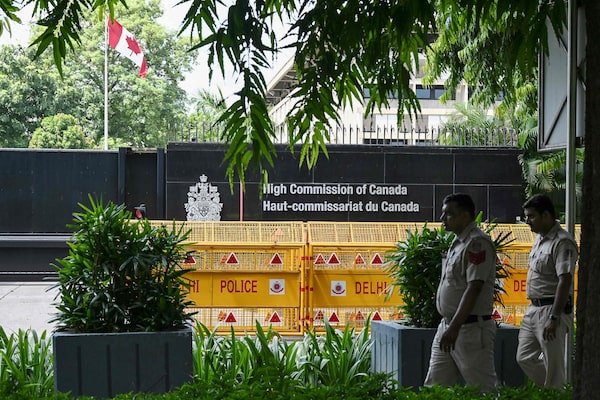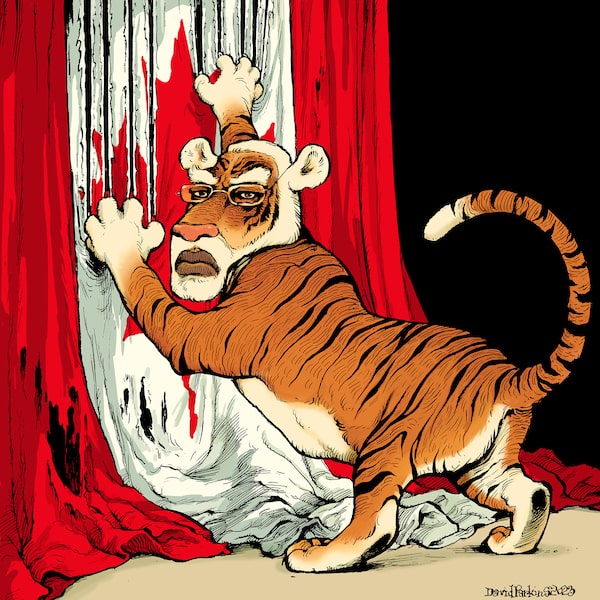Good morning,
Prime Minister Justin Trudeau says he’s not looking to escalate tensions further with India as Canada’s allies showed signs they are unwilling to publicly condemn New Delhi for its alleged role in the slaying of a prominent Canadian Sikh leader.
Trudeau spoke directly to U.S. President Joe Biden and British Prime Minister Rishi Sunak at the G20 summit last week about the matter, but the United States, Britain and other allies have declined to criticize publicly the government of Prime Minister Narendra Modi, which they see as a counterweight to China and a huge economic market of more than one billion people.
On Tuesday, New Delhi ordered Canadian diplomat Olivier Sylvestre out of the country in a tit-for-tat response to Ottawa’s expulsion of an Indian foreign intelligence officer from its High Commission in Ottawa.
- Sikh and Muslim leaders call on Canada to do more to protect citizens targeted by foreign actors
- What is the Khalistan movement, and how was Hardeep Singh Nijjar involved?
- Canada-India dispute the latest blow to strained economic ties
- Campbell Clark: After Trudeau reveals an explosive allegation, both Ottawa and India are doubling down
- Andrew Coyne: Did India assassinate a Canadian citizen?
- Opinion: Justin Trudeau brings Canada’s ties with India under increasing strain

Security personnel stand guard in front of the High Commission of Canada in New Delhi on Sept. 19, 2023.ARUN SANKAR/AFP/Getty Images
This is the daily Morning Update newsletter. If you’re reading this on the web, or it was forwarded to you from someone else, you can sign up for Morning Update and more than 20 other Globe newsletters on our newsletter signup page.
Inflation rate rises to 4 per cent, renewing pressure on Bank of Canada
Canada’s annual inflation rate rose sharply for the second month in a row, suggesting that the Bank of Canada could deliver at least one more interest rate increase this year despite pausing monetary policy tightening earlier this month.
The larger-than-expected increase was driven by gasoline prices, which have surged in recent months. Also, housing costs spiked for both renters and homeowners facing higher mortgage payments. While grocery prices grew less quickly in August than in July, food inflation remains far above most other components of the consumer price index.
Ford, Unifor reach deal averting strike by auto workers
Ford Motor Co. and Unifor reached a deal yesterday before the midnight deadline to avert a strike by auto workers.
A strike would have idled Ford’s Oakville SUV assembly line, and two engine plants in Windsor, as well as parts warehouses in southern Ontario and Edmonton. Unifor national president Lana Payne said the deal addresses the issues members raised before the negotiators sat at the table.
The agreement between Ford and the union is expected to set the template for automotive labour in the electric age.
Got a news tip that you’d like us to look into? E-mail us at tips@globeandmail.com Need to share documents securely? Reach out via SecureDrop
Also on our radar
Zelensky to visit Canada, sources say: Ukrainian President Volodymyr Zelensky will visit Canada and address the House of Commons later this week to rally support as the Russian invasion of his country grinds on, sources say. A visit to Canada has not been formally announced, but sources in Kyiv told The Globe and Mail that Zelensky would travel to Toronto and Ottawa after his stop in Washington.
Azerbaijan and Armenia reach cease-fire deal: Armenian news reports say that a cease-fire agreement with Azerbaijan has been reached on Wednesday to end the two days of fighting in the separatist Nagorno-Karabakh region.
Great Slave Lake hit hard by climate change: After the fires at Yellowknife this summer, there’s been increased focus again on the region around Great Slave Lake and what’s happening to the climate there. New research by a team at Queen’s University shows how the lake itself is being transformed by these changes.
Watchdog criticizes Defence Department over whistle-blower: The Department of National Defence “committed gross mismanagement” and broke the Public Servants Disclosure Protection Act in its handling of whistle-blower complaints, an integrity commissioner found in an investigation released yesterday.
PM backs ban of live horse exports to Japan: The Prime Minister’s Office is supporting a bill brought forward by a Liberal MP yesterday to ban the transport of live horses to Japan for slaughter to make a raw horse-meat delicacy served in high-end restaurants.
Canada loans Romania $3-billion for nuclear reactors: The federal government has given $3-billion to Romania’s nuclear power operator to build two nuclear reactors. The funds will be directed to Canadian companies working on the project. Canada is continuing a long relationship with Romania on construction of nuclear reactors as many of Romania’s neighbours depend on Russian nuclear technology.
Morning markets
Markets await Fed: Stocks struggled for headway on Wednesday while U.S. Treasury yields held near multi-year highs as surging oil prices stoked inflation and set the scene for the Federal Reserve to project interest rates staying higher for longer. Around 5:30 a.m. ET, Britain’s FTSE 100 gained 0.58 per cent. Germany’s DAX added 0.59 per cent and France’s CAC 40 advanced 0.29 per cent. In Asia, Japan’s Nikkei closed down 0.66 per cent. Hong Kong’s Hang Seng lost 0.62 per cent. New York futures were little changed. The Canadian dollar was fairly steady at 74.39 US cents.
What everyone’s talking about
Editorial: “All governments watched housing worsen. Finally, there’s a broad sense an across-the-board overhaul is necessary. The good ideas are in hand. They must be aggressively deployed. What Canada needs is less debating and more building.”
Catherine McKenna: “Indeed, Canada’s oil and gas sector could be part of the solution to the climate crisis instead of a significant contributor. They could be leaders not laggards by making Canada a clean energy powerhouse that creates good jobs for workers and helps Canada win in the trillion-dollar clean economy. Instead, Suncor and fronts like the Pathways Alliance remind us why talk is cheap.”
Today’s editorial cartoon

Illustration by David Parkins
Living better
What is the best place to retire in Canada, income-wise?
Your after-tax income in retirement depends on the strategy you choose in drawing income from different sources. It also depends on where you live. Frederick Vettese charts out the best place to retire in Canada to get the most bang for your buck.
Moment in time: Sept. 20, 1917
Sir Robert Borden addressing Canadian troops in Bramashott, England, April, 1917.
Wartime Elections Act approved
As casualties mounted and recruitment sagged in the third year of the Great War, Conservative prime minister Robert Borden concluded that Canada could only continue to meet its military obligations with conscripted soldiers. He consequently invited the opposition Liberals to join a national or union government dedicated to winning the war whatever the cost. Liberal leader Wilfrid Laurier balked at the coalition proposal, fearing that a pro-conscription government would effectively alienate Quebec and split the country. Undeterred, Borden rammed the Wartime Elections Act through Parliament. Unabashedly partisan in design, the legislation extended the federal vote to the female relatives of men in the military who had served or were serving overseas, while taking it away from immigrants from enemy alien countries who had arrived in Canada since 1902. Closure (limited debate) was invoked on all three readings of the bill, before it sailed through the Senate and was approved by the governor-general on this day in 1917. This devious manipulation of the federal franchise was justified on patriotic grounds and contributed to the formation of a Union government in October, 1917, and Borden’s victory in the December, 1917, general election. Bill Waiser
Read today's horoscopes. Enjoy today's puzzles.
If you’d like to receive this newsletter by e-mail every weekday morning, go here to sign up. If you have any feedback, send us a note.